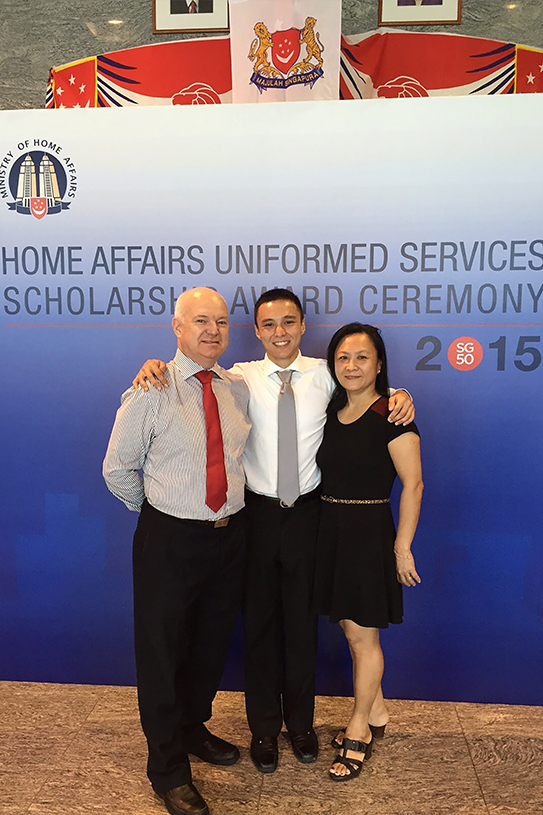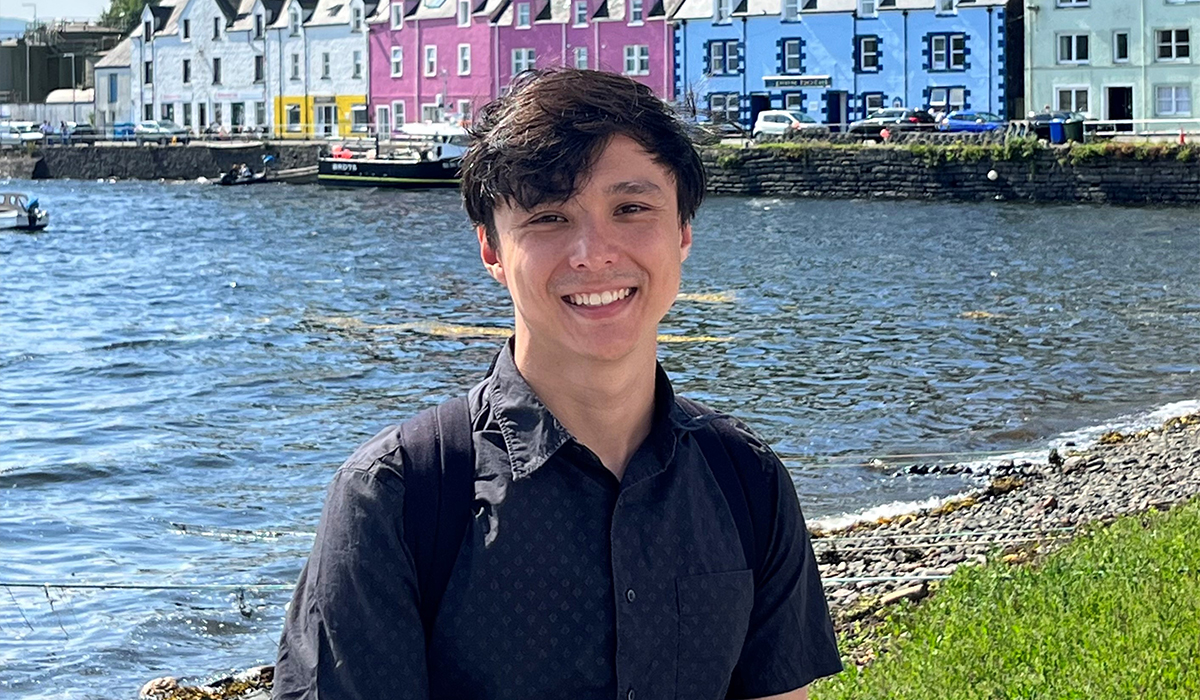James Stuart is currently an Investigation Officer at the Central Narcotics Bureau. He graduated with a Bachelor of Arts with Highest Distinction in History from NUS and is a recipient of the MHA Uniformed Scholarship.
In the ongoing fight against drug abuse in Singapore, the establishment of the Central Narcotics Bureau (CNB) in 1971 marks a pivotal chapter in our history. Entrusted with the mission of keeping Singapore safe from the dangers posed by drugs and inhalants, the CNB swiftly became the nation’s well-respected drug enforcement agency.
Today, CNB remains steadfast in its commitment to preserving Singapore’s safety. The fight against drugs is an ongoing one that combines preventive drug education, tough laws, and robust enforcement as well as effective rehabilitation and aftercare. Every CNB officer thus embodies three vital roles: Enforcer, Educator, and Engager, all dedicated to the sole objective of keeping Singapore drug-free.
Among these dedicated officers is James Stuart, a recipient of the MHA Uniformed Scholarship (CNB).
Presently serving as an Investigation Officer (IO), James adeptly handles drug-related investigations and approaches his job with fairness and compassion. We speak to James to delve into his exceptional career trajectory and learn about his profound passion for his work.
Tell us more about what drew you to CNB.
I was drawn to the excitement of law enforcement work, and I liked that it was not a desk-bound job. I also really agree with Singapore’s drug-free approach because drugs are very damaging to the individual and society. Joining CNB has reinforced my belief that drugs have no place in our society. I have seen the damaging impact that drugs have had on drug abusers and their families, and I never want to see this becoming a widespread plague.
What made you apply for the MHA Uniformed Scholarship?
Initially, I made a scholarship application through the Public Service Commission (PSC) after completing Junior College. As part of the application, I was asked to express my interest in three ministries that I wanted to work at. MHA was one of the three ministries that I expressed interest in. I was subsequently contacted by them and informed about the MHA Uniformed Scholarship.
We hear that you had attachments at CNB during your university breaks. Tell us more about your experiences there.
I had three attachments to CNB during university. I had the opportunity to be attached to different divisions such as the Enforcement Division, Operations Division, and Policy, Planning & Research Division. In my first attachment at the Policy, Planning and Research Division, I learnt about Singapore’s drug control strategies and policies, and the thinking behind them. I felt that it was a good place to start my career in CNB. In subsequent attachments, I did a couple of short stints with the Operations Division and the Staff Development Division. In the Operations Division, I learnt about the processes and thoughts behind the development of operational policies, doctrines and procedures that cut across various operational Divisions. While in HR, I was involved in the reviewing and developing career-related resources.
My most important takeaways from these attachments were learning how the different divisions functioned and what their core job scopes encompassed. This gave me an understanding of CNB’s functions, which has been helpful now that I’m involved in projects that involve cross-divisional collaboration.
Interesting! In what other ways has the scholarship helped enhance your university experience?
It was very liberating as it allowed me to focus on my academic work without worrying about financially supporting myself through my university days. With the allowance provided, I could also pursue other interests and activities during my leisure time. I volunteered as part of the Ministry of Social and Family Development’s Youth Advisory Group, and I did weekly tutoring as part of the Eurasian Association’s Homework Supervision Programme. I could also spend time playing my favourite sport, tennis. The scholarship also helped to offset the cost of going for my overseas exchange programme in Canada.

James Stuart
Tell us more about the various roles you have undertaken at CNB. What is a typical workday like?
Following graduation from the Home Team Academy, we were placed in a two-year foundation programme. It enabled us to have a deeper understanding of the work done by the junior staff so that we could make better operational calls when assuming leadership roles. During my first foundation posting, I was in the Enforcement Division “E”. The work in this Division was more in the frontlines and hands-on as we were regularly planning and conducting drug operations and making arrests. Following the arrests, I would be involved in basic investigation work such as statement-taking. There were also elements of intel collection that I was exposed to in the Enforcement Division. On certain days, I would report to work as early as 5 am and I would only go home the next morning. I remember one particular week when I was attending a course during the day, and I was recalled in the evening to assist with an ongoing arrest that dragged on until the following evening. And though we were given the next day off, we were called back on Thursday evening for an urgent case, and we only went home on Friday morning. While this may sound exhausting, it certainly makes for a good memory and built up my resilience. It was also a valuable experience as it epitomises the hard work and dedication that our CNB officers commit to keeping Singapore Drug Free.
I’m now in the Investigation Division where I’m responsible for investigating drug cases, putting up investigation papers and making appropriate recommendations to the Attorney General Chambers. Whilst the work in the Enforcement Division was more action-packed, the work in the Investigation Division is more behind-the-scenes. At the Enforcement Division, I am required to think on my feet and make quick judgment calls on the ground, conversely the role as an Investigation Officer necessitates more in-depth thinking and analysis of details and evidence. The work hours are still flexible though. The first few hours of each case are usually the most hectic as that is when I’m most involved in conducting my preliminary investigations, making assessments, and planning further actions. I am enjoying the varied exposures and experiences from my different postings in my career.
Do you have any particularly memorable experiences you would like to share?
I handled a case that involved a youth who was abusing cannabis. In this case, the youth had a troubled background, and he had turned to cannabis as a coping mechanism. Having investigated the case, I was able to recommend that he receive counselling and supervision based on clear mitigating factors. I felt this avenue was the most appropriate course of action as he needed the right source of help and support instead of facing a harsher punishment which may have a more damaging impact on him in the long term. To help drug abusers successfully reintegrate into society and to reduce recidivism, there are differentiated pathways of rehabilitation and treatments put in place. As IOs, we have a wide range of options open to us, and it is always a matter of recommending the appropriate path for each case we deal with.
Being a Narcotics Officer is not something that can be learnt at university. What specific training and experiences did you undergo to prepare you for your role?
After being appointed as an Inspector, CNB officers would have to undergo a nine-month residential training at Home Team Academy. We train together with Police Officers and pick up knowledge and skills on legislation, basic law, self-defence, and shooting amongst others. CNB Training Unit also runs courses to equip us with specific CNB-related skills and knowledge.
After this, we have foundational postings at the Enforcement and Investigation Divisions. The foundational postings gave me the opportunity to learn what my team members do on the ground and provided me with exposure to the various aspects of the job. This has proven more valuable than any classroom-bound learning. With these experiences, I’m better able to lead and make decisions confidently to guide my team in different operating terrains.
Finally, what do you want to say to people considering joining CNB?
CNB is unique as it is the smallest Uniformed Home Team Department. I enjoy the fact that we’re a small and tight-knit community. The people are welcoming and friendly regardless of their ranks or positions.
At CNB, the days can be long, but no one day is the same. At times, the work can feel very demanding, but it is rewarding, and I have no regrets.



